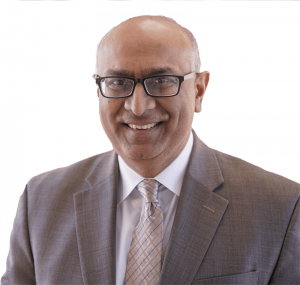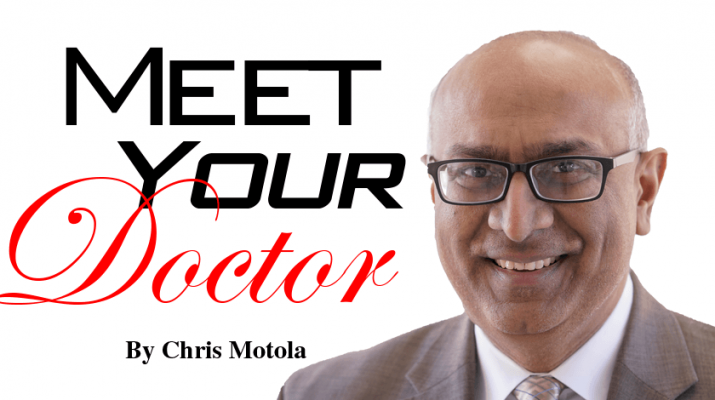New leader at Roswell Park Comprehensive Cancer Center to work with physicians, health plans to improve patients’ access to the latest in cancer treatment, technology
By Chris Motola
 Q: We had been under the impression that you’d left Buffalo and returned, but you’ve actually been here the whole time.
Q: We had been under the impression that you’d left Buffalo and returned, but you’ve actually been here the whole time.
A: I had previously been chief medical officer of HealthNow and left that to join a house-calls medical group called Landmark Health. I was the medical director of their Buffalo operations. Their headquarters is out in Huntington Beach, Calif., so I traveled quite a bit, but I was based here in Buffalo.
Q: You’re currently leading a value-based care initiative. What does “value-based” mean in this context? And why is it being adopted?
A: Roswell Park Comprehensive Cancer Center has such an amazing set of new advances for the treatment of cancer. Many of those are significantly more expensive than a lot of older treatments that aren’t as good for the patient. So along with that comes the responsibility to make sure that we’re making these treatments affordable and making sure they’re covered by the patients’ insurance plans. So, the initiatives that Roswell Park is undertaking will make sure the treatment is affordable and high quality and that patients can get the best treatment that they can for any cancer they might develop.
Q: What kinds of arrangements help you do that?
A: One of the things we do is partner with health plans to help identify opportunities where we can identify cancers in earlier stages. One of the initiatives we have is looking at the use of low-dose CT scanning for patients who are at a high risk of developing lung cancer. Lung cancer is one of those cancers that notoriously get diagnosed late, often in stage IV. With the use of low-dose CT scanning, we can identify those cancers much earlier and identify them in stage I. And when we identify them in stage I, we can treat the patients much more effectively, and we can do it at a much lower cost than if they’re diagnosed at stage IV. That’s just an example of the value-based initiatives we’re pursuing in light of the escalating cost of care.
Q: It seems like we’ve known the value of preventive care forever, but there’s still a lot of resistance to widening access to health care. What are some of the other barriers?
A: I think a lot of times it’s awareness and identify the patients who are at risk. But it’s not just about the testing. It’s also an opportunity to talk to those patients about risk behaviors like smoking in the case of lung cancer, as well as other types of lifestyle changes like diet and exercise. Cancer research has evolved so much. I went to medical school about 35 years ago; over those years, the tools we have to diagnose and treat cancer have evolved a great deal. I know it’s very challenging in a busy practice to stay up to date with everything. So, one of the things we try to do is make sure that the community of physicians know about the new technology and treatment options available to patients with cancer.
Q: You also do outreach to community clinics.
A: Roswell Park does not have an emergency room, so sometimes when patients who are treated at Roswell Park need an emergent treatment, they do seek care at a hospital near to where they live. Hospitals will sometimes be unaware of the potential risks. So, one of our roles will be to make sure we identify those patients when they’re admitted to other hospitals and make sure we’re able to communicate to that hospital the other treatments that the patient is getting. We want to make sure the treatment they’re getting is in line with the therapies we’re giving them. So that’s one example. Another is that much of cancer therapy is outpatient and it’s chronic therapy. Patients are living many years with a diagnosis of cancer. So other physicians in the community have to coordinate with the care patients are getting for cancer to get optimal outcomes for patients.
Q: What kinds of measurable impact have value-based initiatives had on patient outcomes?
A: I’ll answer that by giving you another example of an approach that Roswell Park is very much on the cutting edge of. And that’s identifying cancers that may grow much more slowly or not be as aggressive. Roswell Park clinicians would take an active surveillance approach rather than jumping right to surgery or chemotherapy. An example of that would be renal cell cancer. Oftentimes the outcomes are equally good if we do active surveillance of that than immediate surgery or other forms of treatment. So that’s an example of how our approach may differ than much of the community’s.
Q: Is that because not all cancers develop to a point where they’re dangerous or resolve on their own?
A: Yeah, so different cancers have different rates and degrees of growth. If a patient may not feel any real impact from that cancer within their lifetime, surveillance may be a better approach than active treatment. Prostate cancer is another example. With proper evaluation, we can do active surveillance of that cancer without treatment and avoid surgery and radiation treatments that might have cause more harm than benefit for the patient. Many of the men who have prostate cancer don’t die of it, because prostate cancer grows slowly over a long period of time.
Q: How difficult is coordinating between providers these days given technological improvements?
A: People in the community now often have several physicians where in the past they had a family physician who would do most of the taking care of them. Now many of them have specialists. In those cases, collaboration between those physicians is critical in order to get good outcomes.
Q: You have a background in electrical engineering. Have you found it helpful in informing your medical career or is it just something you were once interested in?
A: As an undergrad, I studied electrical engineering. My background was actually very helpful. When I started my medical training, most practices were using paper charts, so transfer of information was much more complicated than it is today. So my background allowed me to recognize the benefits of electronic medical records early and adapt quickly.
Lifelines
Name: Raghu Ram, M.D.
Position: Vice president of value-based care optimization and community clinical collaboration, Roswell Park Comprehensive Cancer Center. Previously served as medical director at Landmark Health, Buffalo operations; senior medical director and chief medical officer of HealthNow New York Inc.; associate medical director of Univera Healthcare; and chief of family medicine at Kenmore Mercy Hospital
Hometown: Syracuse
Education: University of Buffalo
Affiliations: Roswell Park Comprehensive Cancer Center
Organizations: Erie County Medical Society; American Assocation of Family Physicians; American Board of Family Medicine
Family: Married, three children
Hobbies: Golf, tennis, chess, outdoor activities

